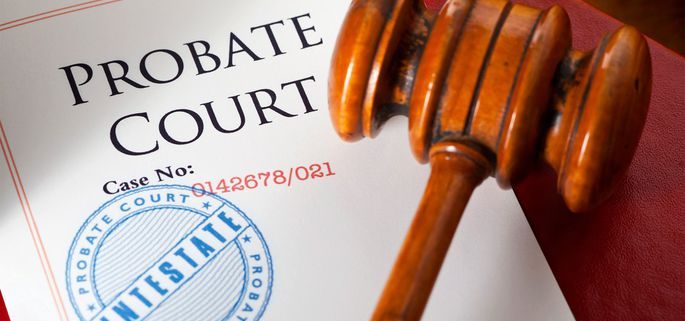Probate 101
When a person dies, the deceased individual is called the “decedent” and the decedent is referred to as having died testate (with a will) or intestate (without a will). A will is a written document executed by a competent person that directs how, when and to whom his or her property will be distributed after their death.
Property, including real estate, personal property and any other assets owned or controlled by the decedent at the time of their death, is referred to as the decedent’s estate. In some situations, the estate may consist of nothing more than personal items such as clothing, jewelry or a small checking account. In other instances, the estate will consist of the decedent’s interest in real estate and other assets that
must be identified, valued and eventually transferred to the intended beneficiaries of the decedent’s estate. These and other tasks are accomplished through the probate process.
The word probate comes from the Latin term “probare,” which means to prove. Probate refers to the action of submitting the decedent’s last will and testament to the proper court and “proving” with appropriate documentation and testimony from witnesses that the will was properly signed and witnessed, and constitutes the decedent’s last will and testament.
“Personal representative” is a term used by the Uniform Probate Code to refer to the person who is responsible for administering the decedent’s estate. If the decedent left a will, the personal representative is often named in the will and is also referred to as the executor. If the decedent did not leave a will, the person who administers the decedent’s estate is known as the administrator.
The personal representative qualifies by taking an oath before the probate court. Once qualified, they have the authority to administer the decedent’s estate. The personal representative is then lawfully able to sign checks and other instruments such as deeds that transfer assets from the decedent’s name to the name of the intended beneficiary. The court will generally issue an order or “letters” to the personal
representative that confirm the person has qualified as such and has the authority to act on behalf of the estate.
The personal representative is under a duty to pay any debts and claims owed by the decedent’s estate. Under applicable state law, the estate’s property is liable for the debts of the deceased owner and all heirs and distributes take any estate property subject to such debts. If claims are not paid, a creditor may be able to reach the decedent’s property in the hands of the heirs or distributes. In order to settle and
pay claims against the estate, the personal representative publishes a notice in a local newspaper that informs creditors of the decedent’s death and the opening of the probate estate. State law sets the requirements of what the notice must contain and how it must be published. Creditors of the estate then file notice of their claims with the court. Applicable state statutes provide creditors with a specific time period in which to file their claims or they will be forever barred.
The estate of the decedent, if of sufficient value, may also owe state inheritance and estate taxes and federal estate taxes. States impose a tax on the estate of the decedent or on the transfer of its assets to heirs. Each state has different tax schedules and exemptions. For instance, inheritances received by spouses or children are generally taxed at a lower rate or may be entirely exempt from taxation than those inheritances received from a brother, sister or other individual. The United States may also be entitled to receive a tax from the assets of a deceased person. The right to this tax and a corresponding lien in favor of the United States attaches immediately upon the death of the decedent, regardless of whether an actual lien is recorded.
Not all estates pay taxes. Only estates whose combined gross assets meet certain levels are required to file returns. The value of the decedent’s estate will consist of more than just the decedent’s real estate. The gross estate consists of the value of all property (real or personal, tangible or intangible) owned by a decedent or in which the decedent had an interest at the time of death such as cash and securities, insurance, trusts, annuities, business interests or other assets. If applicable, federal estate taxes are a lien for 10 years from the decedent’s date of death.
If the decedent died testate (with a will), probate is the formal judicial proceeding used to prove the validity of the decedent’s last will and testament. The property of a decedent may pass to others in accordance with the directions left by the decedent in their will admitted to probate. The person who intends to qualify as the personal representative of the decedent’s estate takes the original will and a certified death certificate to the court that has jurisdiction over the will. The court will examine the provisions of the will and the circumstances under which it was signed. If it appears from affidavits attached to the will or from the testimony of witnesses that the decedent signed the will under the proper circumstances, the will is admitted to probate, or “probated.” The court will enter an order that establishes the validity of the will and that it has been proved to be the valid last will and testament of the decedent. Only wills so ordered and admitted by a court may be treated as valid instruments passing title to real estate. A copy of a decedent’s will is not enough to clear title. Rather, the will must have been proved and probated by a court to establish its validity. Without the court order, the will, by itself, will be insufficient to pass clear title to the property.
If the decedent did not leave a valid last will and testament then the decedent is said to have died intestate and the laws of the state of domicile for the decedent will determine who receives his or her property. When there is no will, the decedent’s property passes to family members under a plan set out by the laws of each state. These laws vary considerably from state to state, and which law applies generally depends upon where the decedent had his or her legal residence at the time of death.
Probate of an intestate decedent is the judicial procedure designed to identify the decedent’s heirs according to applicable state intestate succession laws. In some states, if a person dies intestate but is survived by a spouse, the surviving spouse may be entitled to the entire estate unless the decedent had any children who are not also the children (by birth or adoption) of the surviving spouse. If the decedent had children from a prior marriage, the spouse and surviving children divide the estate. If the decedent was not survived by any spouse or children, the decedent’s surviving parents may inherit the property. If no parents are living then the chain of relations in line to inherit the estate grows more distant and includes brothers and sisters, nieces and nephews and grandparents. If there are no descendants then the
property may pass to the state where it is located. Intestate succession laws vary considerably from state to state and therefore the laws of the state in which the real estate is located should be consulted.
From a title examination perspective, the title report will want sufficient confirmation that the probate of the decedent’s estate has addressed all of the following issues: 1) who has title to the deceased owner’s interests; 2) whether the deceased owner’s creditors have been paid; and 3) whether there are any state or federal estate or inheritance tax concerns. Title is proved by probating the decedent’s will or by properly determining the decedent’s heirs according to applicable state law. Creditor concerns are addressed through the probate process and can also be eliminated by applicable state limitation periods. Estate taxes are addressed by showing that the decedent’s estate is exempt from tax because it does not meet certain threshold levels; or if applicable, by paying the tax and obtaining official receipts or waivers from the appropriate taxing authority.
Reverse professionals who are generally familiar with the probate process and the words and phrases used in the probate context can better help their clients address these issues. This article is only a summary and in some cases it may be necessary to research state law for specific local requirements.
***The information above if for informational purposes only. The Company does not assume any liability or responsibility for the accuracy.***







